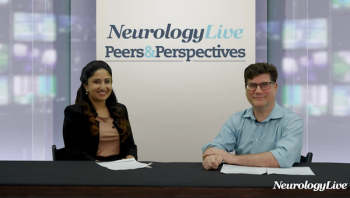Articles by David Weisman, MD

Panelists discuss how emerging therapeutic targets, including amyloid-beta plaques, tau protein aggregation, inflammation modulation, and mitochondrial dysfunction, offer promising approaches for disease-modifying treatments in early Alzheimer disease.

Panelists discuss how recent advances in Alzheimer disease, including amyloid-targeting therapies like lecanemab and donanemab, along with the growing role of blood-based biomarkers for early diagnosis and monitoring, are transforming treatment paradigms, enabling disease modification and personalized care while improving accessibility and reducing barriers to diagnosis.

Panelists discuss how the TRAILBLAZER-ALZ-2 trial demonstrates that donanemab significantly reduces amyloid plaques and slows cognitive and functional decline in early Alzheimer disease, with a manageable safety profile and the potential for faster plaque removal compared to other amyloid-targeting therapies.

Panelists discuss how long-term data from the Clarity AD OLE study support lecanemab as an effective maintenance therapy for early Alzheimer disease, with reduced infusion frequency improving patient and caregiver quality of life, while potentially delaying disease progression and enhancing long-term cognitive and functional outcomes.

Panelists discuss how interim results from the Clarity AD open-label extension demonstrate that lecanemab provides sustained cognitive and functional benefits with a stable safety profile over time, reinforcing the value of early initiation and continuous treatment in Alzheimer disease management.

Panelists discuss how managing ARIA risk in patients receiving lecanemab or donanemab requires structured MRI monitoring, multidisciplinary coordination, and patient education to ensure safe treatment while maximizing the benefits of amyloid-lowering therapies in early Alzheimer disease.

Panelists discuss how clinical experience with lecanemab in early Alzheimer disease shows meaningful slowing of cognitive and functional decline, with observed benefits to quality of life, caregiver confidence, and daily independence—highlighting the importance of early diagnosis, biomarker confirmation, and careful patient selection.

Panelists discuss how cognitive testing tools, functional assessments, and biomarker integration guide Alzheimer disease diagnosis and staging, while early identification enables timely access to disease-modifying therapies, care coordination, and improved long-term outcomes.

Panelists discuss how early recognition of cognitive symptoms, timely referrals, multidisciplinary collaboration, and emerging diagnostic innovations are critical to diagnosing Mild Cognitive Impairment (MCI) and improving access to comprehensive Alzheimer disease care.


